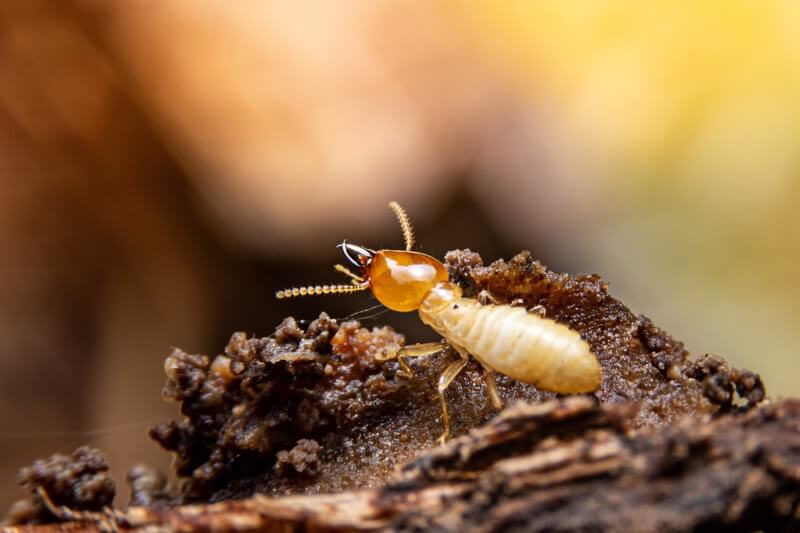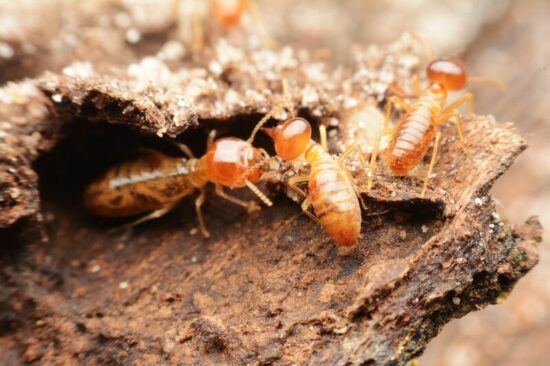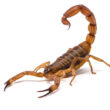Many homeowners want to know if mulch attracts termites, and for good reason. Mulch is widely used in yards all over the world!
This guide will teach you how to deal with termites in mulch around your house, and how to treat mulch for termites.
Table of Contents
Does Mulch Attract Termites?
Mulch can attract termites, but it’s usually not for the reason most people assume.
Mulch is a popular landscaping product that’s nothing more than chipped wood. It’s a great way to recycle wood byproducts and can do a lot to benefit your garden. This natural product can break down to supplement the soil, block out the sun to prevent weeds, and retain moisture.
Because mulch is wood, many assume termites gravitate towards the material to consume it. These pests are fully capable of eating some types of mulch. If you have a softwood or pine bark mulch, there’s a good chance that termites will feed on the wood cellulose.
But the mulch alone is not enough to attract termites in most cases. It’s usually the moisture and heat that causes termites to show up.
Termites are misunderstood pests. Most people don’t realize that these bugs start their lives underground. They burrow massive colonies beneath the soil before swarmers take flight and find a new place to establish a nest.
They get into homes by building durable mud tubes. That’s why you often see them around foundations. The mud tubes help them gain easy access to all the wood they could ever need in your home.
So, why do termites end up in mulch?
Mulch layers that are several inches deep create the perfect habitat for termites. The landscaping material locks in heat and holds moisture. Termites need water to survive, and the heat keeps them warm even in harsh conditions.
It’s a perfect storm for these bugs. Mulch offers a haven that allows the wood-eating insects to burrow deeper into the earth, creating a large colony that will eventually wreak havoc on your house.
The Right Way To Use Mulch
While termites are attracted to mulch, that doesn’t mean you can’t use it on your property. As we mentioned earlier, the material offers many benefits.
The trick to preventing termites in mulch is to use it strategically.
Before you lay the mulch, plan where you want to put it. The most important thing to remember is that mulch cannot touch any part of your building. That means it can’t make contact with siding, the foundation, or any other structural elements. You’re essentially creating an accessible bridge into your domain if it does.

Keep the mulch at least six inches away from your home’s foundation walls. Some experts recommend playing it safe and going a full 12 inches! A wider gap makes it much harder for the termites to make their way to your home.
Another thing you can do to discourage termites from traveling through mulch into your home is to use gravel. Whether you choose to keep the mulch six or 12 inches away from the foundation, use rocks in that gap. Termites don’t eat stone, so they’ll stay away from it.
Using gravel or other rocks can quickly deter hungry termites and keep them away from your place.
Also, dig a small ditch around the foundation after marking where you want to use mulch. The trench should be between the foundation and the start of the mulch. It only has to be about an inch deep, so digging it around your entire house’s perimeter shouldn’t take long.
This ditch serves one purpose only: To hold termite granules.
Fill the ditch with the granules and apply water. The granules will disintegrate with the water, sinking into the soil and killing termites. Termite granules can stop these bugs from establishing a nest for nine months.
It’s another failsafe that makes a world of difference. Once you apply termite granules and lay your gravel, you can use your mulch safely.
Mulch That Termites Don’t Like
Termites are attracted to mulch like traditional pine bark or cypress sapwood. However, they’re not super keen on other varieties.
In addition to following the tips above, one great way to avoid termite ending up in your mulch is to choose the right pest-resistant variety from the beginning. Here are several options that termites typically avoid.
1. California Redwood & Cypress Heartwood
Cypress sapwood might be a favorite of termites, but mulch made from cypress heartwood is different. It contains resins that make living near it unbearable for the pests. The same goes for mulch made of California redwood.
These two wood products are perfect for gardeners. Not only do they keep termites away for years, but they look good as well.
2. Cedar
Cedar is another option for those who are serious about preventing termites in mulch. That’s because the wood has a natural chemical called thujone. Thujone is in many plants, but it’s released when cedarwood goes through the chipping process.
Termites avoid thujone like the plague, so the mulch can give you upwards of seven years without termite issues.
Expert Tip: Many gardeners say that cedar is also ideal for plants. It keeps the soil at a perfect temperature for plant growth!
3. Melaleuca
If you want to save some money, you can use melaleuca mulch. Melaleuca is a type of tree native to Australia. It’s an invasive species that grows abundantly in Florida, so it’s a sustainable wood product. You might see it called “Florimulch.”
Termites hate melaleuca. They don’t eat it and don’t like to live under it to establish colonies. So, it’s a good choice for preventing unwanted infestations in the mulch around your house.
Melaleuca is cheaper than cypress and cedar. But it has a shorter life. On average, melaleuca lasts about two or three years before it starts to decay.
Another choice with similar benefits is eucalyptus mulch. Termites can’t stand the aroma of eucalyptus, making it perfect for pest-free gardening. However, it may be even more short-lived than melaleuca.
4. Rubber Mulch
Rubber mulch is another fantastic option. This unique mulch is usually made of recycled tires. It’s an excellent investment that doesn’t degrade with time. As a result, you can have it for many years.
Because it doesn’t contain any natural wood, termites don’t have any interest in it. If the moisture and humidity levels are right, the bugs might still establish a colony. However, most will avoid it because it doesn’t have the added benefit of being a food source.
Expert Tip: The main downside to rubber mulch is that it doesn’t do much to improve the soil. Unlike wood material, it doesn’t break down and produce nitrogen that your plants can use.
5. Treated Mulch
Finally, you can use treated mulch products if you’re worried about termites.
It’s important to do your research here. There are plenty of chemical-based treatments that do wonders to prevent termites from finding their way into your mulch, but the chemicals could harm the soil quality.
If you want to preserve the soil, you can look for mulches with natural treatments. For example, some manufacturers offer mulches infused with tea tree oil, eucalyptus oil, and other natural ingredients that deter termites.
Treating Mulch For Termites
Think you have some termites in your mulch? The signs are pretty obvious.
You might see those signature mud tubes scattered throughout. You may even spot a few live or dead termites near the surface. You’ll likely see the swarmers emerge from the soil in droves in bad infestations! They come out in the spring, creating a flurry of pests around your property.
Whatever the case, it’s important to address the situation.
There are many ways to treat mulch for termites, but many experts recommend forgoing the pesticides unless it becomes a significant issue. Chemical pesticides will strip away the nutrients in the soil, making it a barren wasteland that’s impossible to support life.
Luckily, there are some better alternatives.
Use Diatomaceous Earth
Good old diatomaceous earth! If you don’t have a supply of this stuff on hand, you’re missing out.
Diatomaceous earth is the ultimate natural pest control product. It’s the fossilized remains of tiny aquatic organisms, and the product comes in the form of a powder.
You can touch the powder with your hands. But the moment it makes contact with termites, it’s over! The tiny particles cause microscopic injuries, soaking all the moisture from the bug until it kills them.
The great thing about diatomaceous earth is that it sticks to termites and kills them slowly. So, they can easily bring it back to the colony and kill many more termites that are living in your mulch.
On top of all that, diatomaceous earth is all-natural. It won’t harm your plants or ruin the soil.
Expert Tip: Sprinkle some food-grade diatomaceous earth onto the mulch that has been attracting termites. You can give the loose material a light toss and sprinkle some more to be on the safe side. Do repeated treatments, and it should take care of those termites in no time.
Spray Boric Acid
Boric acid is another natural product that you can use to treat mulch that has been attracting termites. It dehydrates the pests and sticks to their body for easy spreading.
To use boric acid, mix about a tablespoon of the powder with a hot cup of water. Pour the mixture into a sprayer and go wild! Boric acid is excellent if you have a lot of mulch to treat.
A little goes a long way. Because you’re applying it in liquid form, the boric acid should seep into the soil and take care of termites. It might take several treatments, but it’ll eventually eradicate the colony.
Introduce Nematodes
Nematodes live organisms that feed on bacteria and fungi. They’re a type of roundworm. While smaller than termites, the nematodes can infiltrate the pest’s body and kill them from the inside out.
It’s a fascinating process that happens on a microscopic level. Don’t expect to see much, but you will enjoy the benefits of fewer termites in your mulch.
Nematodes are readily available for purchase at most garden stores. Sprinkle the organisms over the mulch and let them do what they do best.
These organisms are all-natural. Plus, they kill a wide variety of other pests that could ruin your garden.
Use A Natural Deterrent
Our final tip for treating mulch that has been attracting termites is to apply a natural deterrent. Diatomaceous earth and borax can be surprisingly effective. However, essential oils and other products can kill the termites quickly and prevent their return.
Some good options to try include tea tree oil, eucalyptus oil, citrus oil, and vinegar. Using these solutions is straightforward. Simply add a few drops of oil to clean water and spray the mulch.
Expert Tip: For vinegar, a one-to-one mix of water and white vinegar works well. Keep in mind that vinegar can briefly raise the soil’s acidity for a few days. Luckily, its impact is minimal long term.
Is There A Chance That Termites Will Be In Mulch You Buy From The Store?
You might have heard rumors about people finding termites in their store-bought mulch. It’s a tidbit of questionable information circulating on social media. But is there any truth to it?
Termites can appear in store-bought mulch products. However, it’s incredibly rare.
Termites need a colony to survive. You can have a hundred termites in a bag, but those pests aren’t going to live very long without the support of a colony. The wood they’re eating in your mulch is not enough to keep them going for very long.
Generally, the manufacturing and transportation process is too much for termites to survive. The mulch processes are pretty extreme, even for tiny insects such as a termite.
The chances of finding live termites in fresh mulch you buy at a big-box store are rare. But even if you do find a few live stranglers, it’s only a matter of time before they die.
If you want to be on the safe side, you can ensure their quick death by raking the mulch over some asphalt or grass. The sun exposure will take care of the pests for peace of mind.
Either way, you shouldn’t have to worry about a few resilient termites establishing a colony. The chances of that happening are slim to none, despite what you might read.
Conclusion
While mulch can attract termites, you can still use it around your house! All you need to do is be mindful of the information in the guide above, and your chance of having to deal with termites in mulch will decrease significantly.
Let us know if you have any other questions about termites in mulch. We never mind giving feedback and advice to our readers!


